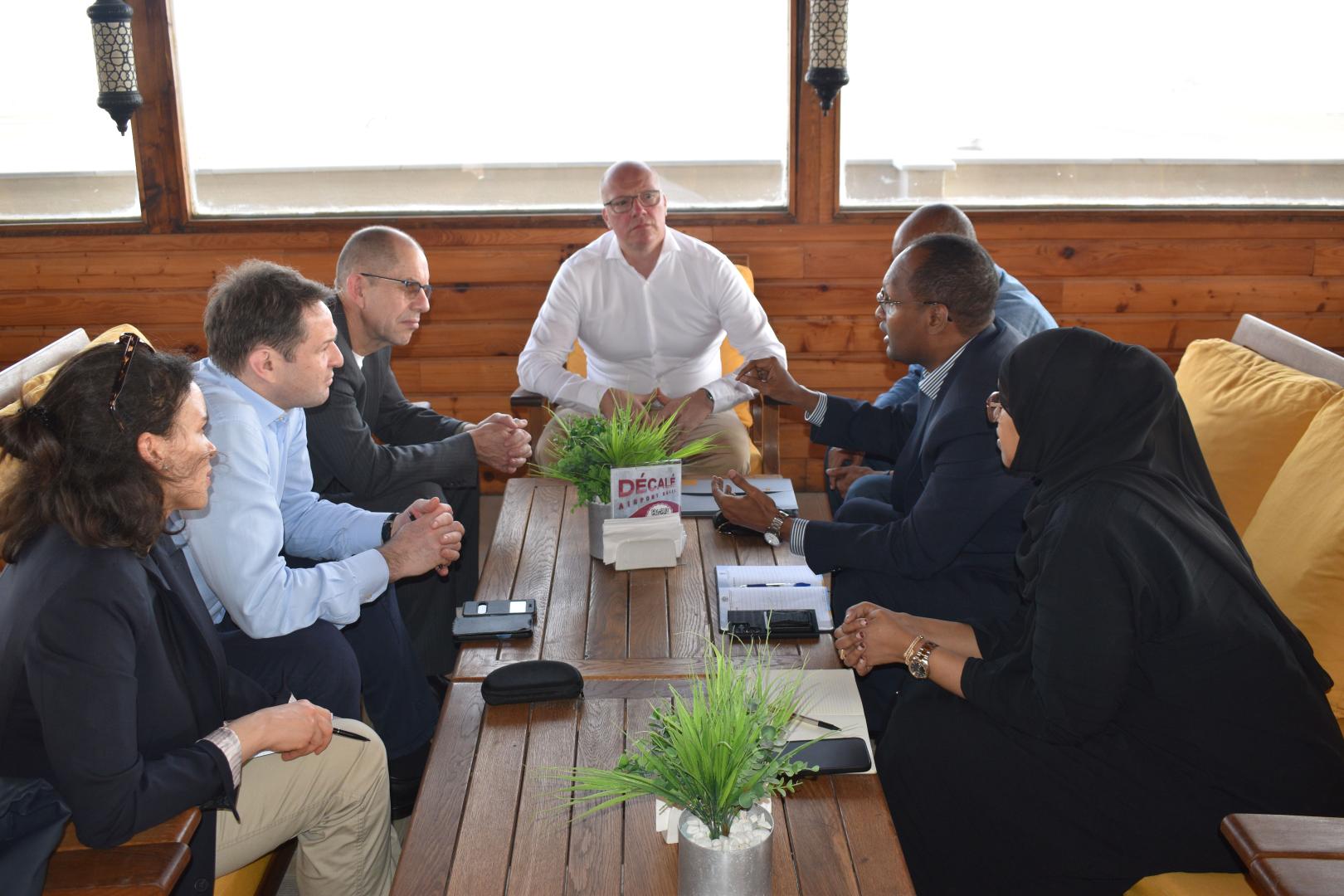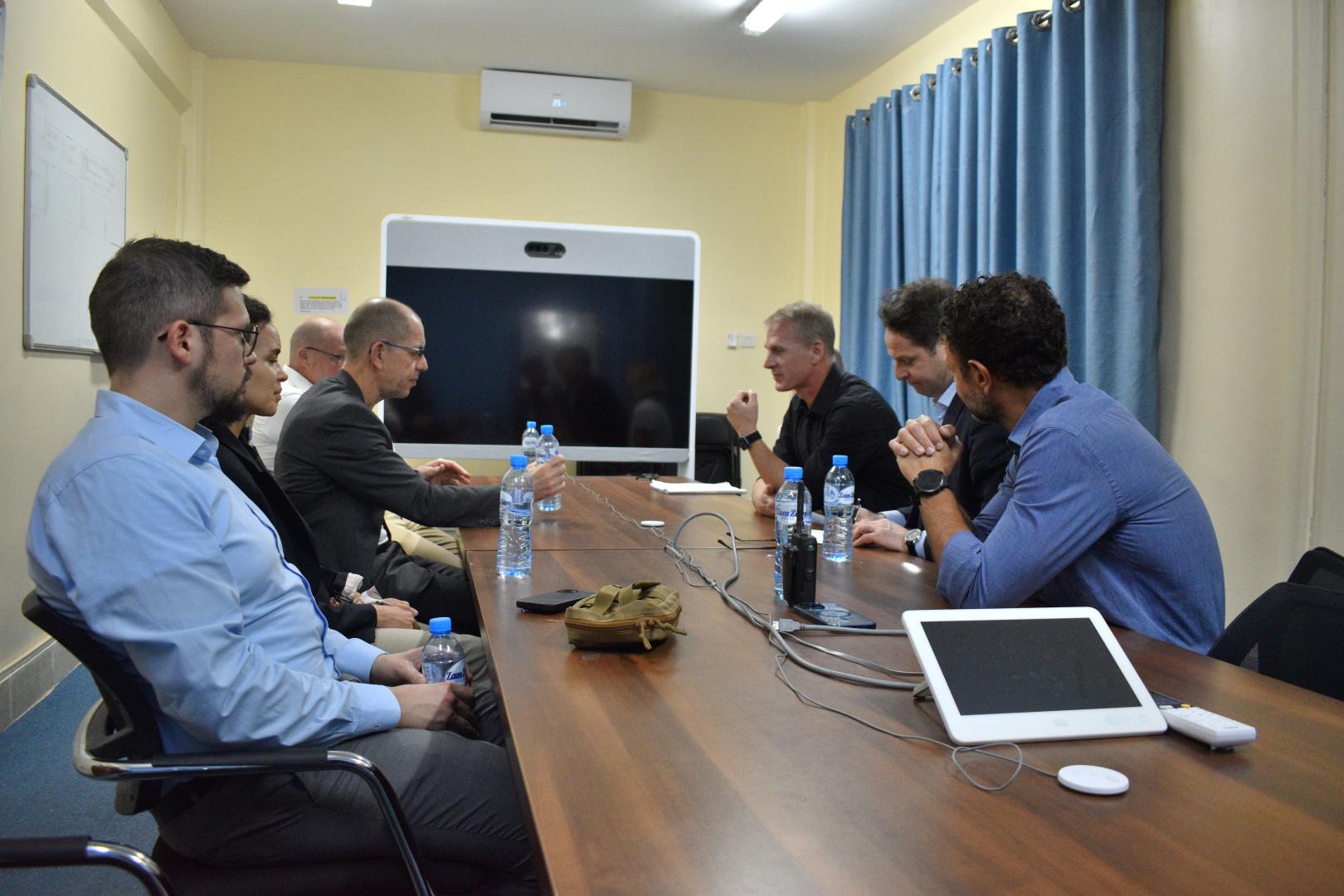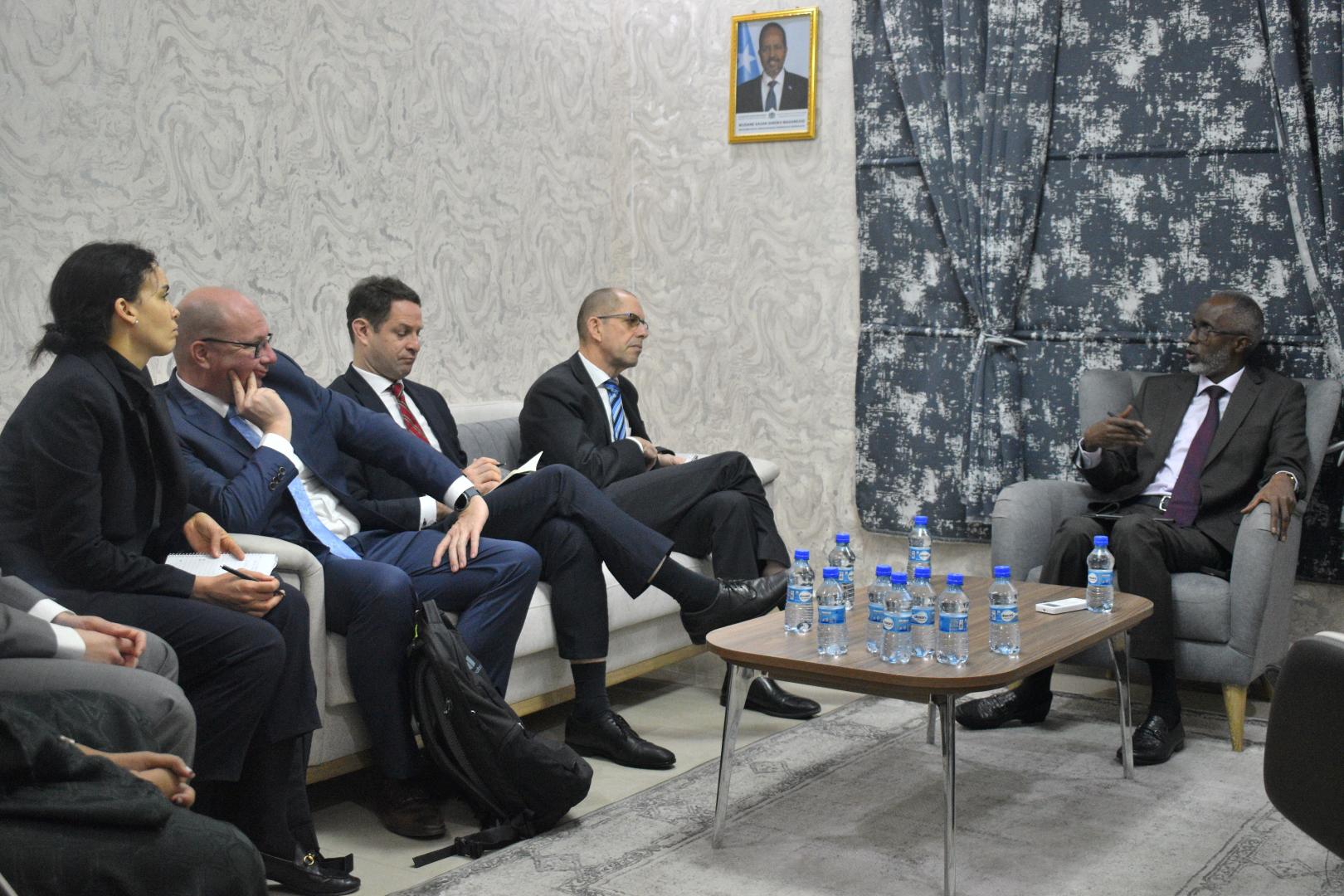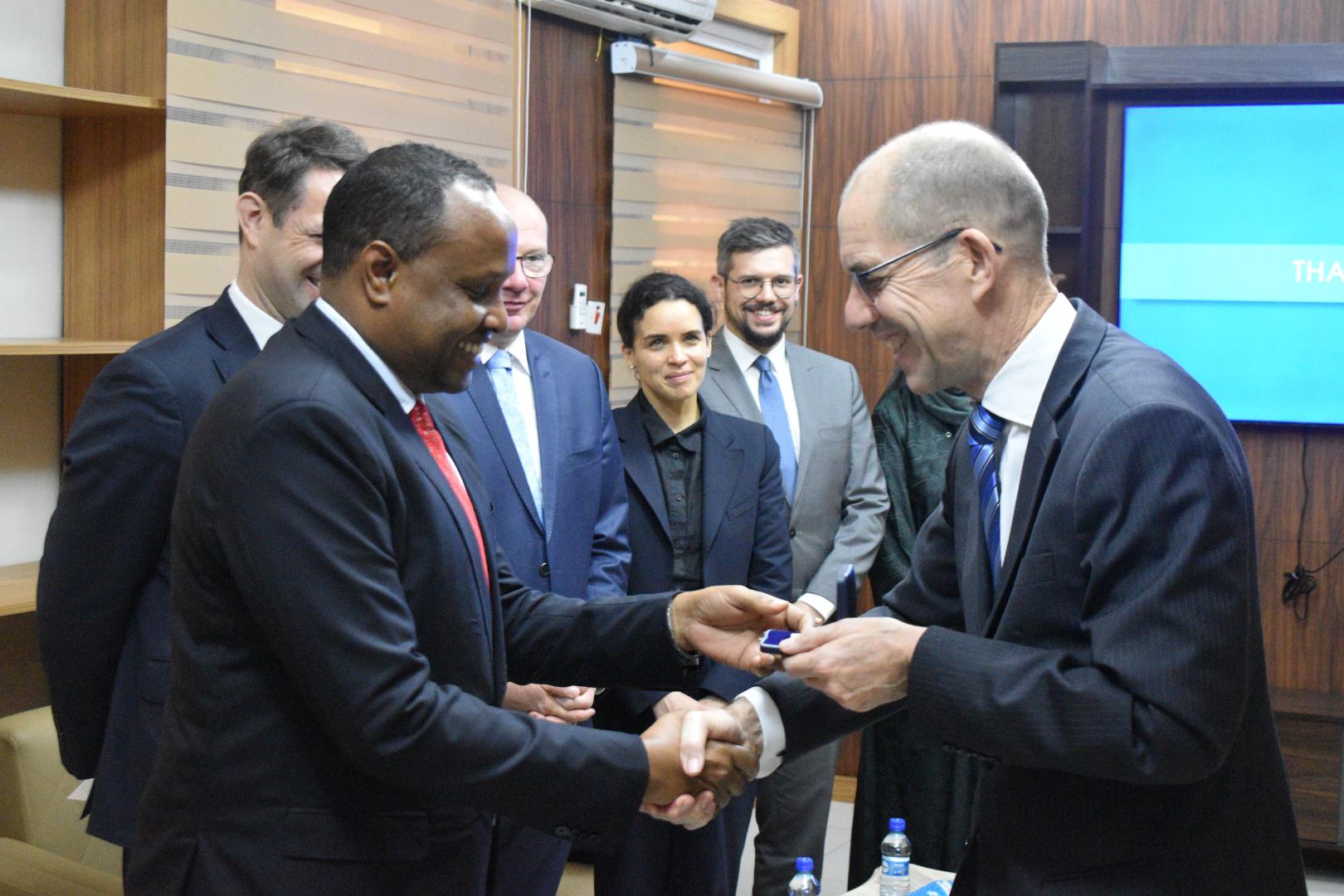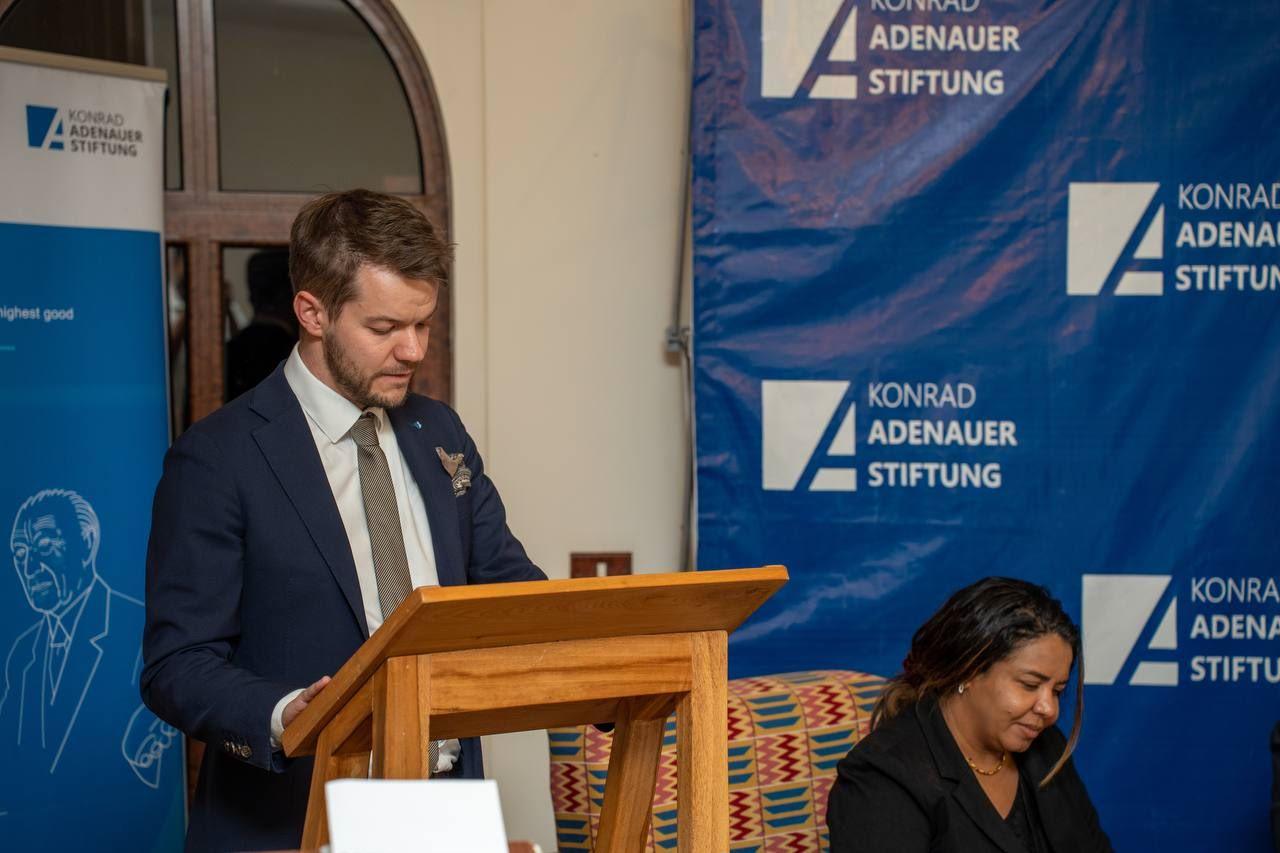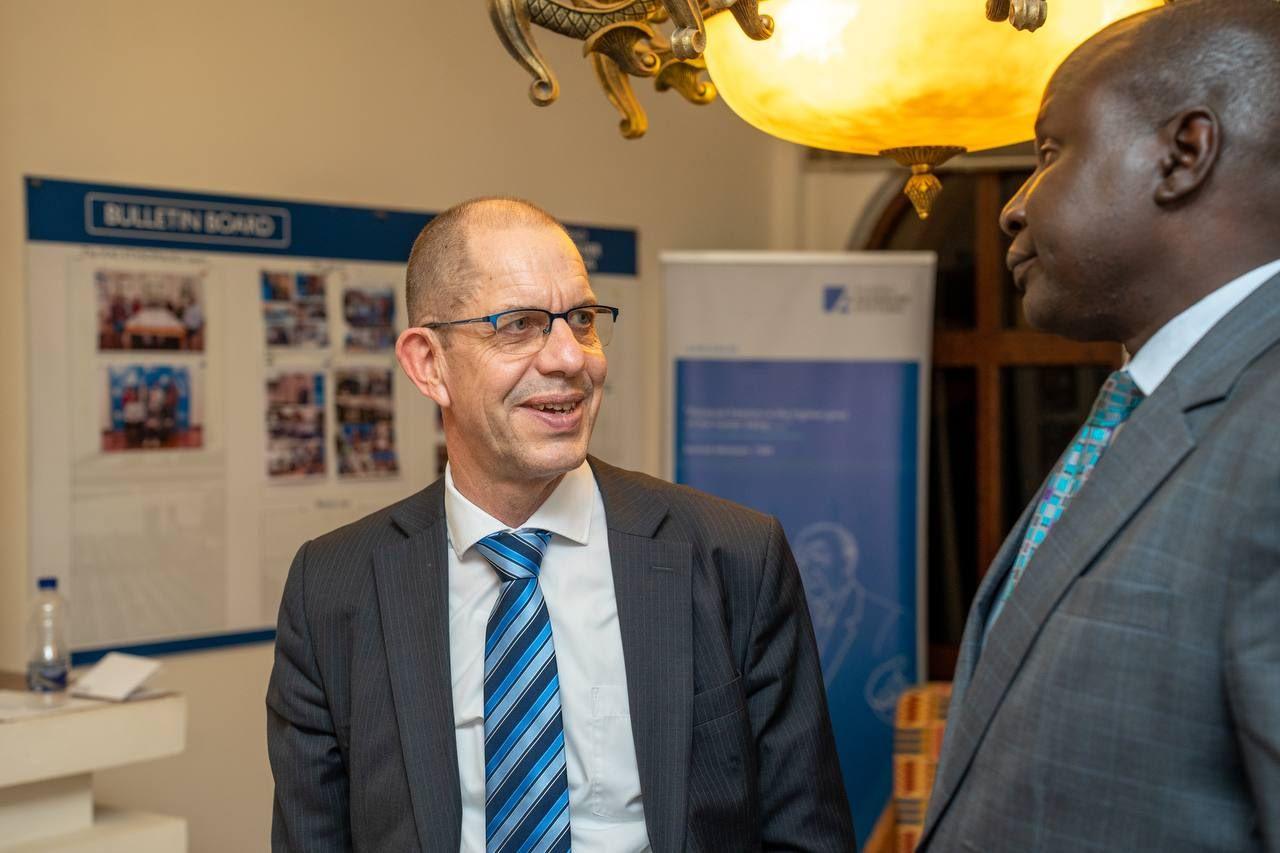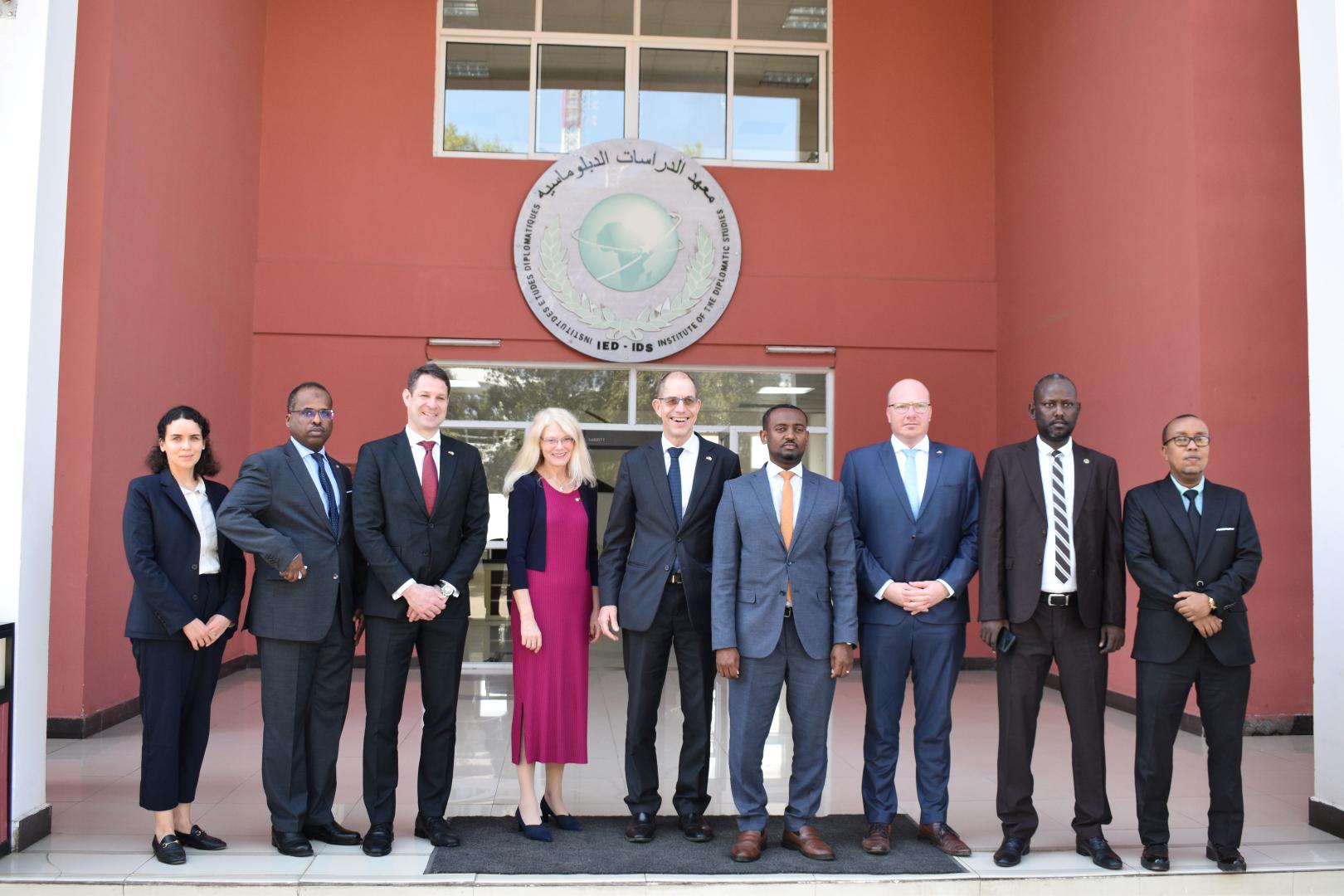From 20th to 26th January 2024, the Deputy Secretary General of KAS, Dr Gerhard Wahlers, and the foreign and security policy advisor of the CDU/CSU parliamentary group in the German Bundestag, Hennig Speck, paid a visit to the Horn of Africa for political talks. The two were accompanied by Paruvana Volkmann, a Policy Advisor to the Executive Office of KAS, and Nils Wörmer, Head of the Regional Programme Security Dialogue for East Africa (RP SIPODI East Africa). In recognition of the relevance of the Horn of Africa for Germany and Europe and the steadily increasing importance of the Red Sea as a security arena, KAS decided already some years ago to set up a programme in the region focusing on international and security affairs. Since August 2022, this regional programme has been based in Kampala, Uganda, and runs projects mainly in Somalia, Djibouti and Ethiopia, and to a lesser extent in Uganda, Kenya and South Sudan.
Mogadishu – uncertain future in a two-front war
After arriving at Aden Adde International Airport in Mogadishu, the delegation was welcomed by representatives of the Somali partner organisation Management Institute for National Development (MIND) Somalia and the responsible coordinator of the assigned security company for an introductory briefing at Décalé Hotel. The following two days in the Somali capital included talks with the Police Commissioner of the United Nations Assistance Mission in Somalia (UNSOM), Police Director Ralf Schröder, the Deputy Head of Mission of the European Union Capacity Building Mission in Somalia (EUCAP Somalia), Dr Fabian Löwenberg, and a visit to the seat of the Somali government (Villa Somalia), which is located outside the highly protected international airport zone. Among the interlocutors from the Somali side were the State Minister in the Office of the Prime Minister, Hirsi Ghaani, as well as high-ranking advisors to the Somali head of government. The guests from Germany also met with members of the Somali parliament and representatives of the Somali security sector. The visit to the Tubsan National Center for Preventing and Countering Violent Extremism and the exchange with its director, Abdullahi Mohamed Nor, was a particular highlight. In Mogadishu, two topics dominated all discussions: On the one hand, the entire Somali political community and the country’s society have been thrown into turmoil since 1st January by the Ethiopian announcement that it may recognise the independence of secessionist Somaliland. On the other hand, crucial decisions regarding the planned withdrawal of the African Union Transition Mission in Somalia (ATMIS) and the future of the fight against the terrorist organisation al-Shabaab are on the agenda.
Political earthquake due to possible agreement between Ethiopia and Somaliland
On 1st January 2024, Ethiopian Prime Minister Abiy Ahmed and Somaliland President Musa Bihi Abdi signed a Memorandum of Understanding (MoU) in Addis Ababa, which apparently provides for the lease of a naval base to Ethiopia in return for the recognition of Somaliland's independence. The signing took place on the day of Ethiopia's accession to the BRICS and just four days after Musa Bihi Abdi agreed with Somali President Hassan Sheikh Mohamud in Djibouti to resume the bilateral dialogue that had been suspended since 2019. Even though the MoU has not yet been published, it seems as if the governments in Addis Ababa and Hargeisa have maneuvered themselves diplomatically offside. Apart from the African Union, the Arab League, and the European Union, almost all regional powers, including Turkey, Egypt, Qatar, and Saudi Arabia, have positioned themselves against recognising Somaliland as an independent state. The UAE, which would benefit most economically from the Somaliland-Ethiopian initiative, is at best passively supporting Addis Ababa and Hargeisa. The two IGAD member states of Kenya and Uganda have not yet made a clear statement. If the contents of this MoU were to be implemented, this would mean a further existential threat to the integrity of Somalia – in addition to the continued existence of al-Shabaab on its own territory.
ATMIS and the future of the fight against al-Shabaab
Somalia suffers more than almost any other country in Africa from the persistence of Islamist terrorist organisations on its own territory particularly Harakat al-Shabaab al-Mujahideen, which is aligned with al-Qaeda, but also structures of the Islamic State remain present. After al-Shaabab carried out a devastating attack on a hotel in Mogadishu on 20th August 2022, President Hassan Sheikh Mohamud, who had by this time only recently returned to office, declared a "comprehensive war" against the terrorist organisation. In a large-scale offensive, larger areas were brought under control by spring 2023. However, it has been clear for some time that the military successes will hardly be sustainable. Apparently, the Somali government did not have a long-term political strategy for stabilising the liberated areas, nor did it have the forces to permanently pacify them. At the same time, al-Shabaab's activities in neighbouring countries, especially in Kenya, have increased. As a result, the heads of state and government of Somalia, Kenya, Ethiopia, and Djibouti agreed on 1st February 2023 to conduct a joint military operation in southern and central Somalia and to deploy additional troops outside of the African Union Transition Mission in Somalia (ATMIS). The long-agreed withdrawal of ATMIS is divided into four phases and is to be completed by 31st December 2024. In around eleven months’ time, the Somali armed forces should have taken over the majority of the forward operating bases of ATMIS in the area and replaced their contingents with their own combat units. This is about as illusory as the calculations underlying the transition (2011 to 2014) and transformation phases (2015 to 2024) in Afghanistan had been. As this is obvious, the debate about a possible military presence of the neighbouring states on the basis of bilateral agreements beyond the ATMIS period dominated the talks in Mogadishu. How difficult it is to push back al-Shabaab in the long term was illustrated not at least by reports on its economic foundations. The terrorist organisation apparently penetrates economic life in the Somali capital to such extent that it has one of its main sources of income by collecting its own taxes and doing business in Mogadishu.
Addis Ababa – potential hegemon and trouble spot in the region
During the one-day stopover in the Ethiopian capital Addis Ababa, the guests from Berlin met with members of the Ethiopian parliament, government representatives and security experts. The programme also included an in-depth discussion with the Ambassador of the Federal Republic of Germany, Stephan Auer, a roundtable discussion on the Sudan Crisis and its implications for Ethiopia and the Horn of Africa with experts from Sudan and an exchange with a representative of the Somaliland Ministry of Foreign Affairs from Hargeisa. The stay in Ethiopia was organised by the KAS Office for Ethiopia / African Union, which has been directed by Lukas Kupfernagel since August 2023.
Internal crises and the agreement with Somaliland
The civil war in Tigray in northern Ethiopia between November 2020 and November 2022 is considered one of the bloodiest of the 21st century so far and led to more than one million internally displaced persons. Almost simultaneously with the entry into force of the "Pretoria Agreement", which ended the civil war in Tigray, the conflict between militias of the Amhara ethnic group and the central government in Addis Ababa escalated. Since then, Ethiopia has been characterised by great instability and insecurity in large parts of the individual federal states. With more than 120 million inhabitants, the country is the world's largest landlocked state. This is particularly explosive for the government, especially that it had access to the Red Sea until Eritrea seceded in 1993. In the course of 2023, Ethiopian Prime Minister Abiy Ahmed repeatedly caused a stir with statements about regaining sea access for his country, if necessary, by any means. This context also partly explains Ethiopia's motivation for concluding the MoU with Somaliland on the establishment of an economic corridor and the construction of a naval base. Many observers assume that Prime Minister Abiy Ahmed is trying to promote the acquisition of a naval base as a national project, similar to the Great Ethiopian Renaissance Dam (GERD), in order to distract attention from the domestic political conflicts and the economic crisis.
The situation in Sudan
On 15th April 2023, violence broke out in Sudan between the Sudanese Armed Forces (SAF) under the leadership of President General Abdel Fattah al-Burhan and the paramilitary Rapid Support Forces (RSF) under the leadership of General Mohamed Hamdan Dagalo (known as Hemedti). The unfolding civil war has been marked by a very high number of civilian casualties from the beginning. This is partly due to the fact that a large proportion of key positions being fought over, such as airports, military facilities, ministries, and administrative buildings, are located in densely populated residential areas of the major cities. A third of Khartoum's inhabitants have now left the city. According to UN figures, more than 7 million people inside and outside Sudan have fled as a result of the fighting over the past nine months. As the country was already home to around 3.7 million internally displaced persons (IDPs) and around one million refugees from other countries before the outbreak of fighting in April 2023, the total number of Sudanese refugees and IDPs is estimated at more than 10 million. This scale of the humanitarian disaster in Sudan meanwhile exceeds the Syrian refugee crisis of ten years ago.
But the interests and influence of regional players stand in the way of ending the conflict. The UAE supplies the paramilitary RSF with weapons, ammunition, and vehicles via Chad. Apparently, General Hemedti has also managed to generate support from Libyan General Khalifa Haftar, Russian mercenaries in Libya and the Central African Republic as well as support networks in Kenya and Uganda. According to yet unconfirmed reports, he also receives some state support in the region, allegedly recently from the Ethiopian government. On the other hand, Egypt in particular is supporting General al-Burhan and the SAF with weapons and equipment, including Turkish-made combat drones. Experts see the risk of the conflict spilling over into Chadian and South Sudanese territory, as large numbers of citizens of both countries are fighting in the ranks of the armed actors in Sudan.
At the end of 2023, there were brief hopes that a meeting between al-Burhan and Hemedti scheduled for 28th December as part of the IGAD summit in Djibouti could mark a first step towards ending violence. However, the meeting did not take place after General Hemedti excused himself, citing scheduling difficulties, and instead held bilateral talks in Addis Ababa on the same day. In the meantime, General Hemedti signed the Addis Ababa Declaration with the former Sudanese Prime Minister Abdallah Hamdok, leader of the civil society democracy movement Taqaddum. In this declaration, he committed himself to the release of prisoners of war, the establishment of a humanitarian corridor and declared his general willingness to a ceasefire. The bilateral talks with General al-Burhan were supposed to take place on 18th January in Kampala with the involvement of Ugandan President Yoveri Museveni on the sidelines of the Non-Aligned Movement summit, but once again failed to be realised. Diplomats in the region familiar with the matter assume that both al-Burhan and Hemedti are currently seeking success on the battlefield rather than at the negotiating table.
Djibouti – anchor of stability in the Horn of Africa and geopolitical hotspot at the same time
The trip concluded with a two-and-a-half-day stay in Djibouti, which also served to consolidate an existing partnership with the Djiboutian Foreign Ministry by signing a Memorandum of Understanding with the Institute for Diplomatic Studies (Institut d'études diplomatiques, IED). The signing ceremony was attended by the German Ambassador to Djibouti, Dr Heike Fuller, and the Djiboutian Ambassador to Berlin, Yacin Houssein Doualé, among others. In addition to the talks at the Djiboutian Foreign Ministry, an intensive discussion took place with Djiboutian academics and political advisors at the Institute for Political and Strategic Studies (Institut d'Études Politiques et Stratégiques, IEPS) at the Centre d'Étude et de Recherche de Djibouti (CERD). The delegation discussed the complex geopolitical situation in the Red Sea and the Gulf of Aden with the Special Representative of the Federal Foreign Office for the Horn of Africa, Heiko Nitzschke, the EU Ambassador Sylvie Tabesse, the Japanese Ambassador Keiichi Hara and the British Ambassador Vinay Talwar. Before and during the visit, there was a detailed exchange with the German Ambassador to Djibouti on the content and future activities of KAS in Djibouti. Before the flight back to Germany, the programme concluded with an overland journey along the East African migration route to Tadjoura and a discussion with a Djiboutian expert on flight and migration.
Geopolitics and international military presence
Djibouti is one of the few stable states in the entire Horn of Africa region. The two neighbouring countries Yemen and Somalia, which are socially and culturally closely linked to Djibouti, have been in chaos for decades. Ethiopia has visibly lost stability in recent years and is now perceived as an insecurity factor in Djibouti. There is still considerable tension with Eritrea following a brief military conflict in 2008. The outbreak of civil war in Sudan and the recent crisis in the Red Sea unexpectedly added two further conflicts with a significant impact on the entire region.
Through the historical experience as a more or less artificial state structure and being surrounded by very large neighbours that have pursued an expansionist foreign policy at times in the almost 50-year history since the country's independence, Djibouti is continuously and strongly leaning towards external powers. The small country is characterised by the phenomenon of hosting permanent military facilities of no less than five foreign powers. The air force base Base aérienne 188 Djibouti "Colonel Massart" and the Base navale de Djibouti, also known as Base navale du Héron after the northernmost (port) district of the city of the same name, constitute France's largest overseas military presence. This naval base is also partly used by other nations. The USA has its only permanent military base on the African continent in Djibouti with the naval expeditionary base Camp Lemonnier, where the Combined Joint Task Force – Horn of Africa (CJTF-HOA), which is subordinate to the US Africa Command (USAFRICOM), is stationed. Since 2017, China has been operating its first and only overseas military base next to the multi-purpose port of Doraleh, which can accommodate up to 5,000 people. Italy and Japan have also set up permanent logistics bases in Djibouti.
New EU mission and the situation in the Red Sea
On 16th January, the European Union's Political and Security Committee (PSC) took the preliminary decision to expand the European Maritime Awareness in the Strait of Hormuz (EMASoH) mission led by France from Abu Dhabi under the new name Aspis (for an ancient Greek shield) and to open it up to non-EU member states. The mission is to be formally established on 19th February as part of the EU foreign ministers' meeting and will flank a British and US operation to protect civilian shipping in the Red Sea. The military planning and preparations are to be completed by this date, meaning that the mission will effectively be ready for deployment as soon as the decision is made. This is due to the attacks carried out by the Yemeni Houthi militia on merchant ships in the Gulf of Aden and the Red Sea since 19th October 2023. It presents Djibouti with the dilemma of having a strong interest in a safe shipping route through the Red Sea for economic reasons, but not wanting to be drawn into the military conflict with the Houthi rebels – especially as its own territory is within the range of the weapons systems used by the Houthi militias.
About this series
The Konrad-Adenauer-Stiftung, its educational institutions, centres and foreign offices, offer several thousand events on various subjects each year. We provide up to date and exclusive reports on selected conferences, events and symposia at www.kas.de. In addition to a summary of the contents, you can also find additional material such as pictures, speeches, videos or audio clips.



